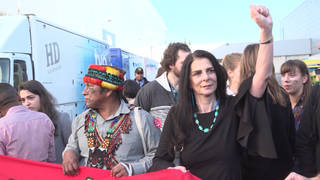
“Our movements must be bigger than recycling and braver than holding signs,” said Rose Whipple, a member of the Santee Dakota and Ho-Chunk, and youth delegate with SustainUS, who joined a panel of youth climate activists at the United Nations climate summit in Madrid, Spain. Indigenous peoples from Canada and the United States are at the summit, speaking out against extraction, new pipeline projects and the environmental devastation of their territories, and calling for movements to center the rights of indigenous peoples.
Transcript
AMY GOODMAN: This is Democracy Now! We’re broadcasting from Madrid, Spain, at the U.N. climate summit. Indigenous people from Canada and the United States are speaking out against extraction, pipeline projects, the environmental devastation of their territories at this summit. On Monday, Rose Whipple, a member of the Santee Dakota and Ho-Chunk and youth delegate from SustainUS, spoke on a panel of youth climate activists.
ROSE WHIPPLE: I remember the sunshine on my skin as I stood at the headwaters of the Mississippi River, the drinking source for over 18 million humans. Here, in Mni Sota, I joined other indigenous youth to prepare for our month-long canoe journey through our stolen ancestral homelands. We paddled to raise awareness of the Line 3 tar sands oil pipeline that threatens to devastate our communities. We dipped our cupped hands in the river, sipping the clean water. This is the same sacred river where my Dakota ancestors have been harvesting our sacred mahnomen for thousands of years. This river is important and sacred, not only to my ancestors, but for my people still to this day. We happily canoed down this river for weeks, smiling and laughing, sharing our dreams for a fossil [fuel-free] world. Soon after, everything changed. Things were darker — the sky, the water, the air. Our group came underneath the shadow of a factory looming over our lands like a nightmare. Our sacred waters were sick, our hope melting into despair. And it was then that we took action.
In a historic case against the pipeline, we came together as youth to intervene with five other tribes to fight for justice. Although we fought for our river, begged them to leave our waters and lands alone, to say no to the Line 3 pipeline, it wasn’t enough. The pipeline was unanimously approved. We have been fighting these extractive projects through the U.S. court system, but this colonial institution continuously values corporate profit over indigenous lives. Today this injustice and my hope are the fires that have brought me to this room.
Hau mitakuyepi. Rose Whipple emakiyapi. Santee hemateha. Hello, my relatives. My name is Rose Whipple, and I’m 18 years old. I am attending these global negotiations with the first-ever SustainUS indigenous youth delegation from the United States. We’re here to share these stories, to share our prayers and bring a frontline fight to the halls of the United Nations. Our people come from many different lands, waters and cultures, yet each of us are here together calling on the strength of our ancestors to remind us of our commitments to future generations. Our movements for the protection of our sacred sites and lands sound like “Protect Mauna Kea,” “No Shasta Dam raise” in California, “Stand with Bears Ears” in Utah and “Demilitarize Guam.” Our movements for our waters sound like “Stop Jordan Cove” in Oregon, “Save Bristol Bay” in Alaska, “No Keystone XL pipeline” and “No DAPL expansion” across the Great Plains, and especially “No Line 3 pipeline” in Minnesota.
The climate crisis is more than a discussion about a 1.5 degrees Celsius. It also looks like stolen and caged children at the U.S.-Mexico border. It looks like missing and murdered indigenous women. People are dying. Indigenous land defenders are being murdered. The climate crisis is a spiritual crisis for our entire world. Our solutions must weave science with spirituality and traditional ecological knowledge with technology. Our movements must be bigger than recycling and braver than holding signs. It is up to each and every one of us to build movements that center the rights of indigenous peoples, healing and justice for the next seven generations. It is time for us all to reconnect with Mother Earth. It is time to remember how to listen to her, to guide our climate solutions. Destroy white supremacy.












Media Options